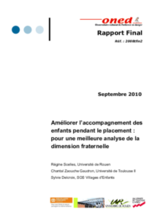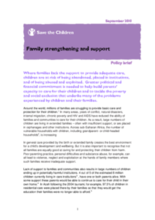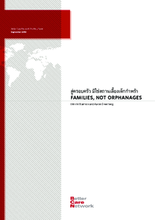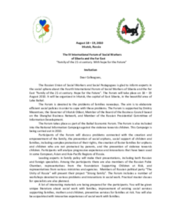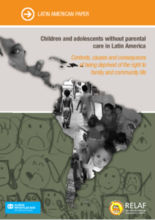Demographic Data
|
Sources: World Bank, UNDP, UNAIDS, DHS 2013 |
Displaying 13101 - 13110 of 14389
For this investigation, reporters posed as a minister and a business woman to witness cases of child abuse that have claimed the lives of some children in a children's home in Ghana.
In this study, data from 60 nationally representative household surveys (36 countries) were analyzed to establish if orphanhood and adult household illness consistently identified children with worse outcomes and also to identify other factors associated with adverse outcomes for children.
SOS Villages d'Enfants a décidé de proposer une étude visant à aider les professionnels à travailler mieux avec la fratrie en les dotant d’outils d’analyse et d’évaluation. En effet, dans un contexte où une meilleure évaluation des situations des enfants est recherchée par tous, aucune recommandation précise n’existe pourtant pour permettre d’intégrer les relations fraternelles dans l’évaluation des besoins des enfants.
Call for greater political and financial commitment to help build parents’ capacity to care for their children and to tackle the poverty and social exclusion that underlie many of the problems experienced by children and their families.
A fact-finding report on the fleeing of juveniles from the Government Observation Home, Special Home and Children’s Home (Combined) for Boys at Berhampur under Ganjam District of Orissa on 21-22 September 2010
With particular attention to lower income countries, Families, Not Orphanages examines the mismatch between children’s needs and the realities and long-term effects of residential institutions.
With particular attention to lower income countries, this paper examines the mismatch between children’s needs and the realities and long-term effects of residential institutions. The paper examines available evidence on the typical reasons why children end up in institutions, and the consequences and costs of providing this type of care compared to other options. The paper concludes with a description of better, family-based care alternatives and recommendations for policy-makers.
This compilation provides policymakers, programme managers, non-governmental organizations and others interested in implementing family skills training programmes with a review of existing evidence-based family skills training programmes. Its purpose is to provide details of the content of such programmes, the groups targeted, the materials used and the training implemented, in order to assist users in selecting the programme best suited to their needs and to offer guidance as to the kind of programmes available.
The Russian Union of Social Workers and Social Pedagogues is glad to inform experts in the social sphere about the Fourth International Forum of Social Workers of Siberia and the Far East “Family of the 21-st century. Hope for the Future”.
This paper aims to show different organisations, institutions, governments and civil society the reality facing thousands of children in Latin America. This information can be used as a tool for debating and prioritising the issue as well as promoting constructing good practices and public policies that will improve the wellbeing and chances to develop of children without parental care and/or who are at risk of losing

